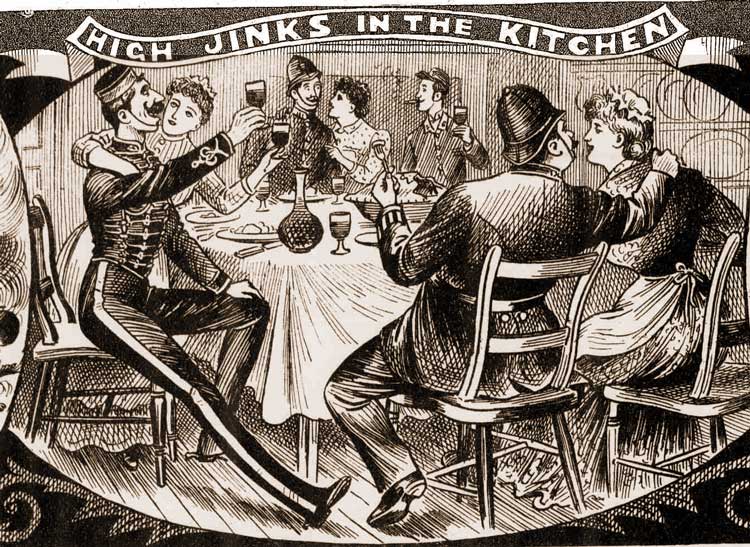There is an old song that claims that “A Policeman’s Lot Is Not A Happy One” and, it must be said, that may well have been the case for many of the officers whose job it was to keep order on the streets of the Victorian metropolis.
However, as can be deduced from the following case, that was reported by the Illustrated Police News on Saturday, 10th March, 1894, a policeman’s lot was, if not happy then it was certainly eventful should your beat happen to take in the district of Belgravia, one of the wealthiest enclaves of London:-
HIGH JINKS IN A KITCHEN
“At Westminster Police Court, on Wednesday, Constable Harradine, 71B, attached to the Gerard Road Station, Pimlico, appeared before Mr De Rutzen to a summons at the instance of Emma Roberts with respect to the paternity of a child of which she alleged him to be the father.
Mr. J. J. Washington appeared for the complainant, Mr. T. D. Dutton for the defendant.
The court was crowded with policemen, many in plain clothes, during the proceedings.
THEY BECAME INVOLVED
The prosecutrix, a good looking woman of thirty-two, deposed that she was formerly in service at 6, Belgrave Square, where she was employed as a cook. A number of other servants were kept.
In the early part of 1892, the defendant became a frequent visitor to the house, and he showed her attention. He frequently stayed for supper, and sometimes took her to places of amusement.
In June of the year mentioned, she went with him on the police excursion to Bournemouth.
A CHILD WAS BORN
A child was born on April 1st last year.
Some months prior – during the third week in the preceding November – she told him of her condition. He begged her not to tell any other policemen about it, as so many of the force visited the house. (Laughter).
At first, she was disposed to take no steps against him; but on hearing lately that Harradine had referred to her as “a low woman” and “no better than she ought to be”, she had taken out this summons.
VISITORS TO THE HOUSE
Cross-examined by Mr. Dutton, she said that she had had a baby twelve years ago, when in service at Leicestershire, by a Coachman, who was going to marry her, but didn’t was the father.
She recollected the Police Fete at Crystal Palace in June 1892. She accompanied the housemaid to the palace, and they met a lot of constables there, the defendant among them.
Afterwards, several policemen and two other male acquaintances went home with them to Chesham Street for supper.
Besides the policemen, the female servants were visited by soldiers, postmen and male servants from other houses.
Only two soldiers came as her friends. The lady’s maid had one, and the others had general invitations – and were friends of all of them.

THE CROSS-EXAMINATION
Mr Dutton:- “Do you know any of the Blues?”
Witness:- “Several, but they came to see the footman”. (Loud laughter)
Mr Dutton:- “How about the postmen?”
Witness:- “Only two postmen, I think.”
Mr Dutton:- “How many gentlemen’s servants came?”
Witness:- “I don’t know, I never counted them.”
Mr Dutton:- “You did not care whether they were married or single?”
Witness:- “I never troubled.”
Mr Dutton:- “Who is Franky?”
Witness:- “Oh, he is another policeman named Parry.
Mr Dutton:- “Has he written to you?”
Witness:– “Three or four times. His letters referred only to money I lent him once. When he told me what Harradine had said of me, and that he (Harradine) would not marry me, I commenced to cry. Parry, by way of a joke and to cheer me up, said he would buy the baby a cloak.”
JULIA SULLIVAN’S TESTIMONY
Julia Sullivan, the housemaid at Chesham Street, when the complainant was the cook there, said she had seen Harradine at the house at all hours of the day and night.
From May to November, 1892, he was there sometimes as often as twice a day, and his practice was, when he could, to stay till nearly midnight.
The witness used to leave the cook and the policeman alone together when she went to bed.
Opening the door suddenly on one occasion, she had seen improper familiarity between them.
MR. DUTTON AND THE WITNESS
Cross-examined, she said that she had had a baby a few days after the cook.
Mr Dutton:- “I think that you got drunk at the police fete?”
Witness:- “No, I think we were lively,we enjoyed ourselves.” (Laughter) And we got home at about 11.30.
Proceeding, the witness stated that she went to bed, leaving the cook with the policeman and two civilian friends.
She understood that they all had supper.
Mr Dutton:- “You did not always confine your hospitalities to policemen?”
Witness:- “Nearly all policeman – mostly policemen.”
Mr Dutton:- “Sometimes postmen came to supper?”
Witness:- “Oh yes, they had supper as well.”
Mr Dutton:- “And you did not confine yourselves to policemen and postmen, I believe you doated on the military?”
Witness:- “Yes we had a few soldiers. not so very many.”
Mr Dutton:- “May I take it that you did not always confine yourselves to policemen, postmen and soldiers, but that you also had an extensive visiting circle of visiting gentlemen’s servants?”
Witness:- “Yes, we certainly kept a good deal of company in the kitchen.”
Mr Dutton:- “You know Frank Parry, the policeman? He used to visit the complainant. I think?”
Witness:- “I assure you he was no more fond of cook than he was of me – he was fond of us all.” (Roars of laughter.)
CASE DISMISSED
Mr. De Rutzen said that he could not credit anything that these servants deposed to, except one thing, and that was that they had turned their employer’s house into a brothel.
He dismissed the summons with costs.”
